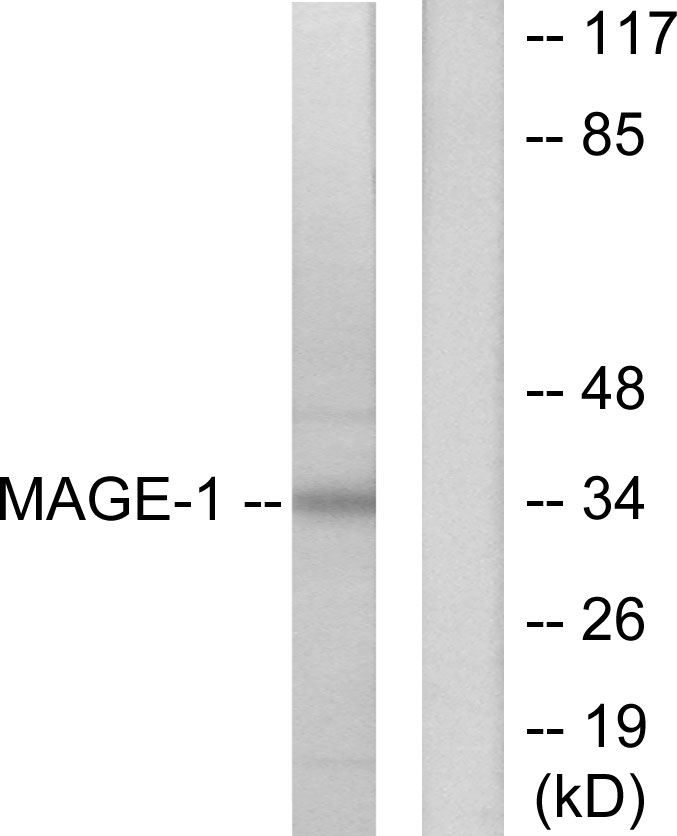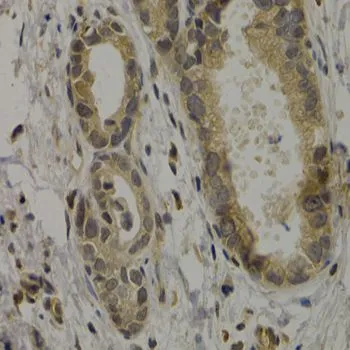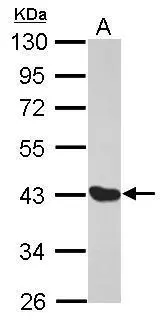![IHC-P analysis of human testicular carcinoma tissue using GTX34809 MAGE 1 antibody [MA454]. IHC-P analysis of human testicular carcinoma tissue using GTX34809 MAGE 1 antibody [MA454].](https://www.genetex.com/upload/website/prouct_img/normal/GTX34809/GTX34809_20200115_IHC-P_1196_w_23060801_194.webp)
IHC-P analysis of human testicular carcinoma tissue using GTX34809 MAGE 1 antibody [MA454].
MAGE 1 antibody [MA454]
GTX34809
ApplicationsImmunoHistoChemistry, ImmunoHistoChemistry Paraffin
Product group Antibodies
ReactivityCanine, Human, Rat
TargetMAGEA1
Overview
- SupplierGeneTex
- Product NameMAGE 1 antibody [MA454]
- Delivery Days Customer9
- Application Supplier NoteIHC-P: 1-2microg/ml for 30 minutes at RT. *Optimal dilutions/concentrations should be determined by the researcher.Not tested in other applications.
- ApplicationsImmunoHistoChemistry, ImmunoHistoChemistry Paraffin
- CertificationResearch Use Only
- ClonalityMonoclonal
- Clone IDMA454
- Concentration0.2 mg/ml
- ConjugateUnconjugated
- Gene ID4100
- Target nameMAGEA1
- Target descriptionMAGE family member A1
- Target synonymsCT1.1, MAGE1, melanoma-associated antigen 1, MAGE-1 antigen, antigen MZ2-E, cancer/testis antigen 1.1, cancer/testis antigen family 1, member 1, melanoma antigen MAGE-1, melanoma antigen family A 1, melanoma antigen family A, 1 (directs expression of antigen MZ2-E), melanoma antigen family A1, melanoma-associated antigen MZ2-E
- HostMouse
- IsotypeIgG1
- Protein IDP43355
- Protein NameMelanoma-associated antigen 1
- Scientific DescriptionThis gene is a member of the MAGEA gene family. The members of this family encode proteins with 50 to 80% sequence identity to each other. The promoters and first exons of the MAGEA genes show considerable variability, suggesting that the existence of this gene family enables the same function to be expressed under different transcriptional controls. The MAGEA genes are clustered at chromosomal location Xq28. They have been implicated in some hereditary disorders, such as dyskeratosis congenita. [provided by RefSeq, Jul 2008]
- ReactivityCanine, Human, Rat
- Storage Instruction-20°C or -80°C,2°C to 8°C
- UNSPSC41116161







![IHC-P analysis of human testis tissue using GTX34810 MAGE 1 antibody [SPM282].](https://www.genetex.com/upload/website/prouct_img/normal/GTX34810/GTX34810_20200115_IHC-P_1224_w_23060801_688.webp)